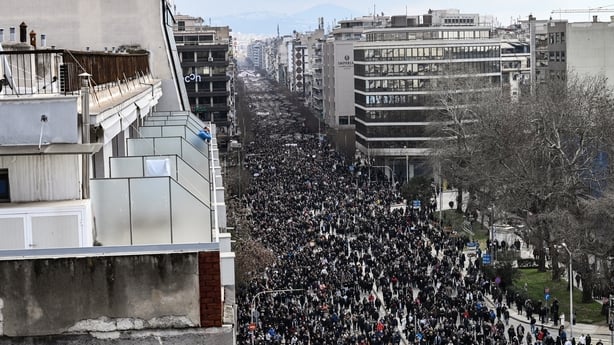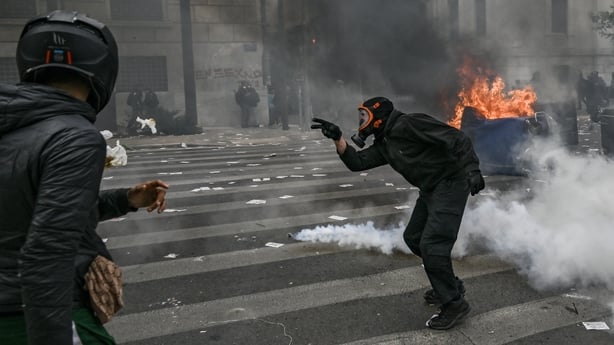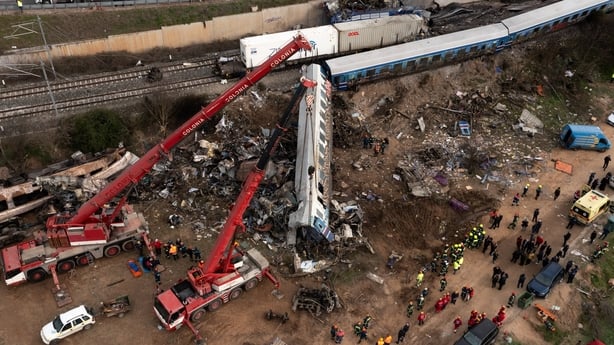Clashes broke out in Athens as hundreds of thousands of people rallied across Greece to demand justice on the second anniversary of the country's deadliest-ever train crash, and striking workers brought air, sea and rail transport to a halt.
Fifty-seven people were killed when a passenger train filled with students collided with a freight train on 28 February 2023, near the Tempi gorge in central Greece.
Two years later, the safety gaps that caused the crash have not been filled, an inquiry found yesterday. A separate judicial investigation remains unfinished and no one has been convicted in the accident, fuelling popular anger.
Nearly 200,000 people had turned out in peaceful protest in Athens, but the crowd, including children and the elderly, were forced to disperse when several hooded attackers threw firebombs and rockets at police, prompting them to respond with teargas and stun grenades.
The ambulance service said five people were taken to hospital, including a photographer hit in the head by one of the grenades.
"The crowd was extremely packed and many panicked," protester Sofia Yianniri said. "We tried to get people with children out."

Police earlier said some 325,000 people had turned out nationwide in demonstrations described by commentators as unprecedented in size and "historic".
In the capital, many were forced to walk several kilometres to join the protest as subway trains heading downtown were already jammed with passengers.
Schools, many shops, public services, trains, ferries and most flights were shut down by what is expected to be Greece's biggest mobilisation in recent history.
According to the victims' families, protests and gatherings were being held in over 200 cities and towns in Greece and other European countries, as well as in cities worldwide with large ethnic Greek populations, such as New York and Melbourne.

In a rare move, justice officials held a moment of silence and a one-hour stoppage before in memory of the victims.
Several prominent artists joined the walkout, shutting down theatres and music clubs, while many shop owners put signs on their shuttered businesses that read "we demand justice".
Opinion polls indicate that most Greeks believe officials covered up vital evidence following the crash, slowing down an investigation that is still incomplete.
Over 40 people have been prosecuted, including the local station master responsible for routing the trains, but a trial into the tragedy is not expected before the end of the year.
The two trains had travelled towards each other on the same track for miles without triggering any alarms.

The crash was blamed on faulty equipment and human error.
The government has rejected accusations by opposition parties that it was behind an "organised plan" to shield senior officials from responsibility.
"Society is angry because society has been misled," government spokesman Pavlos Marinakis said this week.
"One of the aims by a large part of the opposition is to lead to tension, to an explosion, through misinformation," he said.
Opposition parties will call a no-confidence vote against the government next week, in addition to a parliamentary inquiry into whether officials were too quick to bulldoze the disaster site and, as a result, destroyed vital evidence after the collision.
Prime Minister Kyriakos Mitsotakis, who has dismissed calls to resign, has accused critics of attempts to "destabilise" the country and "sink political life into a quagmire".
Mr Mitsotakis has long been criticised for hastening to attribute the accident to human error just hours after the official investigation began.
An experts' report funded by the victims' families has claimed the freight train was carrying an illegal and unreported load of explosive chemicals, which contributed to the high death toll.
Yesterday, Greece's state aviation and railway safety investigation agency said there was a "possible presence" of an "unknown fuel" at the scene.
The train's operator, Hellenic Train, has denied knowledge of any illegal cargo.
The Athens prosecutors' office has summoned Hellenic Train's former CEO Maurizio Capotorto on suspicion of giving "false testimony" to a parliamentary investigative commission last year.
There is also broad scepticism over the unexpected emergence of camera footage allegedly showing the freight train on the night of the accident, apparently showing no unusual containers.
Under privacy laws, surveillance videos are supposed to be automatically deleted within two weeks of filming.

